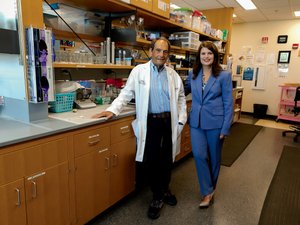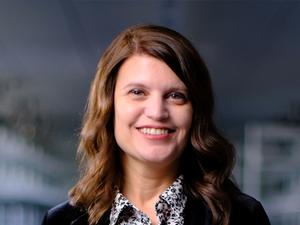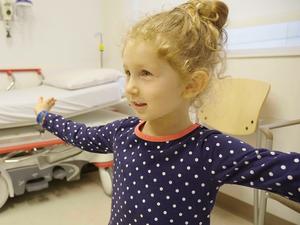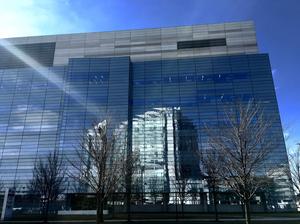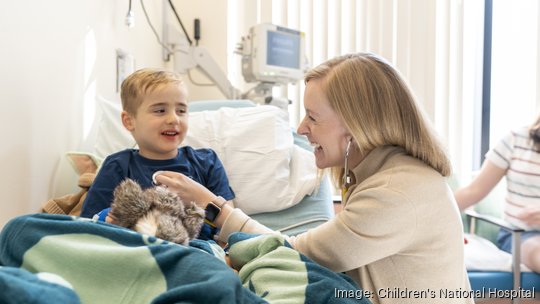
With two gene therapies on the market, Nationwide Children's Hospital had income of $48.6 million from licensing its technology in 2023.
That brings its commercialization total to some $253 million over the past nine years. It had just passed $200 million a year ago.
"That gives us the ability to figure out innovative ways to invest into the process and support this virtuous cycle," said Matt McFarland, vice president of commercialization and industry relations.
Tech transfer at the Columbus pediatric hospital has broadened in scope, with more medical devices and therapeutics in other specialities, McFarland said.
"Our office is engaging more with everything from vaccines and (infectious disease treatment) to behavioral health, and understanding ways we can help those researchers with translation of their efforts to public impact," he said.
Total revenue from royalties, equity stakes and other payments in licensing deals was up from $29 million last year.
Researchers and clinicians made 80 new invention disclosures – the first point of contact with the commercialization office, which was up from 70 each in 2021 and 2022. There are 30 disclosures so far in the first quarter of this year, McFarland said.
Children's also formed three spinouts in 2023, according to data from the hospital.
Three licenses generated more than $1 million in revenue last year, McFarland said, but could not disclose specifics.
Two of those are among the first gene therapies approved by the U.S. Food and Drug Administration, both of which target fatal neuromuscular conditions: Zolgensma, approved in 2019 for spinal muscular atrophy, and Elevidys, approved last June for certain patients with Duchenne muscular dystrophy.
Sarepta Therepeutics Inc., which licenses Elevidys, paid Children's $10 million in June when the treatment was approved, and $6 million in royalties by year's end, according to its quarterly and annual reports.
"We were very excited to see ... that technology come to fruition and get to patients," McFarland said. "A lot of work has gone on from both sides to get to that end goal."
Studies are under way to expand approved uses of the treatment. The FDA had approved it only for 4- and 5-year-olds who hadn't yet lost much mobility.
Boston-based Sarepta (Nasdaq: SRPT) licenses several treatments directly from the Wexner Research Institute at Children's, and gained some with its $174 million acquisition of the hospital's spinoff Myonexus Therapeutics Inc. in 2019.
The relationship led Sarepta to establish its main R&D lab in Columbus. The company has expanded its lease within the Easton-area building and plans another expansion this year, according to the annual report.
"It's a huge point of pride for us," McFarland said.
Zolgensma had $1.2 billion in sales in 2023, according to the annual report of Novartis, which licenses the technology. The amount of royalties to Children's is not disclosed.
Children's 2021 revenue record of $70 million included $38 million up-front payment in July 2021 for Sarepta's deal with Roche to make and sell Elevidys outside the U.S., according to Sarepta's annual report. Children's has not previously disclosed all the sources of that year's total, which also included the acquisition of a spinoff.
No other payments are due to the hospital under the Roche deal, which brought Sarepta a $1.2 billion payment and ability to earn up to $1.7 billion on sales.
Commercialization revenue goes to the hospital itself, which decides how to allocate the funds among funding more research, growing the commercialization office or other clinical initiatives such as in behavioral health.
For example, Children's plans to recruit 50 researchers in the coming years, who will need startup funding for staff and labs before they secure outside grants.
The hospital also established a joint $30 million investment fund with Ohio State University last year, managed by Rev1 Ventures to help launch biotech spinoffs from the two institutions.
Children's total commercialization revenue for 2023 is more than 2022's combined earnings of a dozen other Ohio institutions reporting to the licensing survey by national trade group AUTM. (The 2023 report comes out in late fall.)
Investments Children’s started two decades ago, funding research and commercialization, along with its collaboration with Ohio State University have led to a blossoming cell and gene therapy industry in Central Ohio. Veterans of the hospital are now sprinkled among Sarepta’s lab, a contract research organization and two critically needed biological manufacturers.
"We're trying to propagate all the potential the region contains," McFarland said. "It’s a win for everybody. … evangelizing the cool stuff going on in Central Ohio right now."
